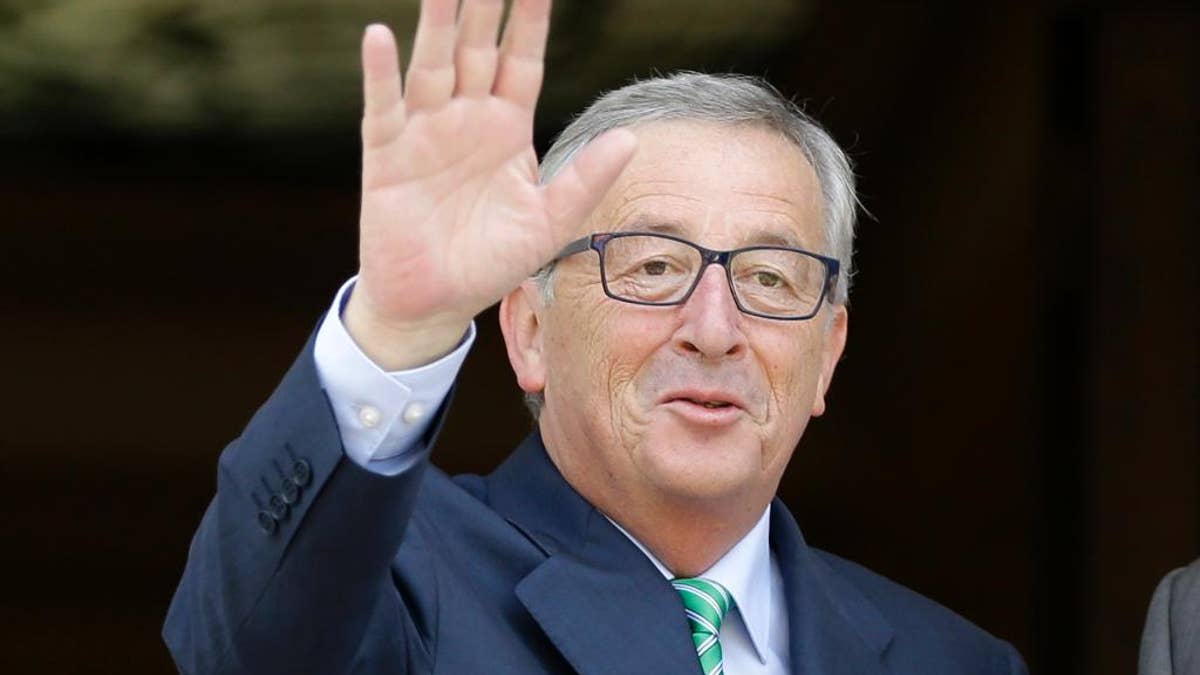
Jean-Claude Juncker, president-elect of the European Commission, left, waves to the media at the Maximos Mansion in Athens, Monday, Aug. 4, 2014. Juncker is visit Athens in his first trip since his election by the new European Parliament last month. He meets Greek Prime Minister Antonis Samaras, a fellow conservative, to express support for the country's ongoing effort to make its public finances sustainable. (AP Photo/Thanassis Stavrakis) (The Associated Press)
Wednesday, in a speech before the European Parliament, Jean-Claude Juncker, the EU Commission president, summed up the current situation: “There is no reason to put things in rosy colors - we are not in a good state," he said. "There is a lack of Europe in this union and a lack of union in this European Union.”
Juncker has a gift for understatement. Hundreds of thousands of uninvited refugees from the murderous regimes of the Middle East -- and job seekers from its backward economies -- are banging at the gates of Europe.
The EU’s disunion is apparent in its wildly differing responses to what is becoming a threat to the continent’s political cohesion.
Many (perhaps most) of the mob at Europe’s gates are not even refugees—they are young men looking for work. There are, of course, genuine asylum seekers among the Muslims, but to equate their present European hejira to Jews fleeing the Nazis or Arab Christians escaping ISIS is a form of willful stupidity.
Chancellor Angela Merkel, the most important single figure in Europe, wants a wide open door. Germany is willing to unilaterally take in half a million newcomers annually and it also supports the EU proposal, voiced by her ally Mr. Juncker, to compel each of the member states to absorb a relative proportion of a pool of 160,000 migrants.
It is not at all certain that the EU can compel its sovereign members to follow this, or any, order. And there are many governments, mostly among those Donald Rumsfeld calls “New Europe,” that are strongly opposed. They view the mass of humanity descending on them as a security problem and a threat to their European identity. Poland, the Czech Republic, Slovakia, Estonia and Cyprus have already made it clear that they will take migrants only if they are “culturally compatible” (translation: not Muslims).
Hungarian Prime Minister Victor Orban has been the most vociferous in his opposition. He calls mass migration “an act of madness” that will irreversibly alter the continent’s demography and its Christian civilization.
Even in Old Europe there is a notable lack of enthusiasm for an open door. Denmark has been publishing warnings throughout the Middle East, in Arabic, that migrants would be happier elsewhere. It has also temporarily cuts its rail link with Germany to staunch the flow. Great Britain is rejecting the EU quota system. It will consider only bona fide asylum seekers selected from among registered refugees, not migrants who cross into Europe and hop a train across the Channel.
The Merkel-EU position is, to a large extent, an exercise in public relations. It is supposed to prove that the continent is no longer the home of the Nazis and their accomplices, but a magical realm of tolerance. In Mr. Juncker’s words, it is a place where, “the baker in Kos gives his bread to hungry and weary souls...the students in Munich and in Passau who bring clothes for the new arrivals…the policeman in Austria who welcomes exhausted refugees upon crossing the border.”
There may indeed be such beneficent bakers and students and policemen. But there are many others who wonder how the unsupervised influx of countless foreigners—mostly male, mostly broke, mostly products of reactionary tribal cultures—will affect daily life.
Such questions are not supposed to be asked in polite society.
“Europe has made the mistake in the past of distinguishing between Jews, Christians, Muslims,” Mr. Juncker said. “Europe has made the mistake in the past of distinguishing between Jews, Christians, and Muslims. There is no religion, no belief, and no philosophy when it comes to refugees.”
This sounds very enlightened. And very naïve. Many (perhaps most) of the mob at Europe’s gates are not even refugees—they are young men looking for work. There are, of course, genuine asylum seekers among the Muslims, but to equate their present European hejira to Jews fleeing the Nazis or Arab Christians escaping ISIS is a form of willful stupidity.
There are two standard answers to this: One, anyone who raises a security concern about mass Muslim immigration is a racist! And two, even if such immigration is not especially desirable, there is nothing Europe can do about it.
“We can build walls; we can build fences,” Mr. Juncker told the EU Parliament, “but imagine for a second if it were you, your child in your arms, the world you knew torn apart around you. There is no price you would not pay; there is no wall you would not climb.”
In other words, this migration, good or bad, is unstoppable. Might as well spread your arms and embrace it (and, in Germany at least, the cheap labor that comes with it).
Meanwhile, in the Middle East there are countless millions of men and women who would love to escape the various experiments in Middle East self-government in which they are trapped for the glorious Eden depicted by Mr. Juncker. How they will feel—and react—when they arrive and encounter European realities is something the EU should consider carefully before it falls prey to its own hypocritical moral preening.
